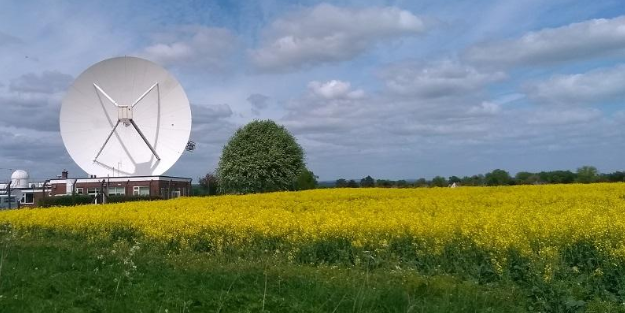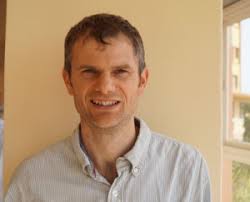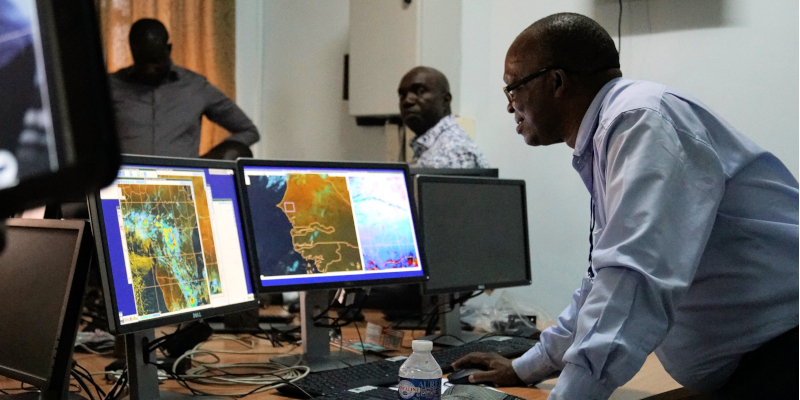Renewed partnership builds on a decade of successful weather and climate research

The University of Leeds’ prestigious membership of the Met Office Academic Partnership (MOAP) will continue, welcoming the Universities of Edinburgh and Birmingham.
The University is a founding member of MOAP, established in 2010, and can now build on successes from over the last decade, delivering world-class research, impact and education.
The need to deliver on net-zero, adaptation to climate change, and early warning to inform early action to reduce impacts of extremes is growing as the climate crisis deepens. MOAP Leeds draws together experts in atmospheric and climate science, social science, climate impacts science, computing and mathematics. It provides research to underpin the delivery of improved forecasts, to inform climate change mitigation and to support adaptation to the growing impacts of climate change.
MOAP Leeds is notable for its excellence in disciplinary, interdisciplinary, and transdisciplinary research, which is increasingly solutions driven, capitalizing on the University’s investment in the Priestley International Centre for Climate.
Continued membership of MOAP will allow us to build on our successes from over the last decade, delivering world-class research, impact and education.
As the need to achieve net zero emissions grows, and early warning information becomes ever more important to reduce impacts of extreme weather events, MOAP Leeds offers critical expertise in atmospheric and climate science, social science, climate impacts science, computing and mathematics.
MOAP Leeds provides research to underpin the delivery of improved forecasts, to inform climate change mitigation and to support adaptation to the growing impacts of climate change.
The rapid development of new technology is changing the face of research and demands new skill sets. The University’s Centre for Environmental Modelling and Computation (CEMAC) hosts five dedicated software development scientists allowing long-term development of technical skills, and facilitating science and impact.
Building on successes
Professor John Marsham, Met Office Joint Chair at Leeds and Chair of the Academic Partnership, said: “Our membership of MOAP is of high strategic value to the University, and is in direct alignment with the University’s ambitious 10-year strategy for a University that help shapes a better future for humanity.
 Professor John Marsham, Met Office Joint Chair at Leeds and Chair of the Academic Partnership
Professor John Marsham, Met Office Joint Chair at Leeds and Chair of the Academic Partnership
“Continued membership of MOAP will allow us to build on our successes from over the last decade, delivering world-class research, impact and education.”
We look forward to collaboration across the growing MOAP community, and with external partners nationally and internationally.
Leeds has the UK’s largest concentration of earth and environmental sciences (Research Excellence Framework, REF, 2021) and MOAP Leeds is notable for its breadth of expertise. Since its formation, MOAP Leeds has created almost 500 Met Office/Leeds co-authored, peer-reviewed publications, that have led to significant impact in the UK and overseas.
MOAP research contributed to three of five impact case studies submitted to the REF 2021 (where 96% of Leeds’ research was rated world-leading or internationally excellent).
MOAP made an instrumental contribution to the University’s prestigious 2021 Queen’s Anniversary Prize, awarded for groundbreaking work in weather and climate science for the Global South, informing early warnings and climate change adaptation. Leeds developed the Global Model of Aerosol Processes (GLOMAP), which was adopted as a core component of the Met Office’s model development strategy and Leeds research has improved UK weather alerts.

The University hosts three joint professors and three visiting professors. The six-member Leeds University Met Office Strategic Research Group hosts joint staff based at Leeds and spans composition, dynamics, social science & mathematics, some with joint positions with CEMAC.
The partnership sees Met Office co-supervision of student research, enabling broader supervision expertise, increased impact, and increased networking and training opportunities. Its early career researchers have won major awards, including three Royal Meteorological Society L F Richardson prizes.
Met Office staff contribute to undergraduate teaching on some of the best UK taught programmes associated with careers in meteorology and climate science.
Professor John Marsham, Met Office Joint Chair at Leeds and Chair of the Academic Partnership, said: “Continued membership of MOAP will allow us to expand our solutions-led research, drawing on not only on our outstanding weather and climate science, but increasingly our inter-disciplinary and computing expertise, to deliver the solutions that society needs, across net-zero, adaptation and early-warning for early-action. Our collaborations extend from state-of-the-art climate projections to the social science of decision making.
“For example, we are working with the Met Office to maximise the benefits of the unprecedented high-resolution modelling that their supercomputer now enables, whilst working with users to ensure such research targets priority needs and deliver maximum benefit.”
Bringing together the best of UK scientific research
Dr George Pankiewicz is the Met Office Head of Science Partnership who jointly oversees the partnership. Commenting on the future of MOAP, he said: “Tackling the challenges of high-impact weather and climate can no longer be treated as a single discipline as it increasingly requires involvement from scientists in other sectors including health, technology, artificial intelligence, and the social sciences.
“So, we are developing our academic partnership to bring together the best of UK scientific research.”
By working with other centres of expertise we can cover topics where the Met Office doesn’t necessarily have an acknowledged expertise.
Met Office Chief Scientist Professor Stephen Belcher said: “Extreme weather events and climate change pose among the greatest risks facing humanity. Tackling them is an urgent and huge undertaking.
“The Met Office can’t do it alone – the Met Office Academic Partnership harnesses the best of UK research and will give us the best chance of coping with and adapting to future change.”
